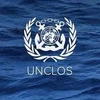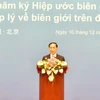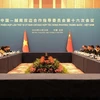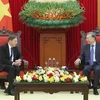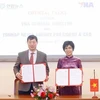French general, Daniel Schaeffer, said in a recent interview with the English language news website DtiNews that Vietnam and ASEAN countries should cooperate to deal with China’s schemes in the East Sea.
Schaeffer, an expert on Chinese issues, gave the interview after a conference on issues surrounding Hoang Sa (Paracel) and Truong Sa (Spratly) archipelagos held in the central city of Da Nang from June 20-21.
*China has recently brought a second oil rig into the East Sea threatening Vietnamese waters, placed close to China’s Hainan Island. In your view, what is China's intention in this move?
I think there are several possible scenarios. It’s possible that they will tow it close to the existing and contentious Haiyang Shiyou-981 oil rig.
However, another possibility is that China keeps the oil rig near Hainan Island before withdrawing the Haiyang Shinyou-981 rig. After the Haiyang Shinyou-981 was placed on Vietnam’s continental shelf, it was moved around 23 nautical miles, east-northeast, from its first position. They may just claim that they found something and move it.
It’s also possible that the second oil rig will be placed in Vietnam’s unexplored underwater oil fields. The second oil rig may be taken to sea areas belonging to the Philippines or Malaysia or Indonesia, but within the Chinese “nine-dotted lines".
*What are the potential risks of this second oil rig?
There are two scenarios I can see. If the oil rig is taken to the Pacific Ocean, it may help mitigate tensions between Vietnam and China over the East Sea. However, if the second oil rig is pulled to Vietnam’s waters, it would heighten the current tensions between the two countries, despite Chinese State Councilor Yang Jiechi’s recent visit to Vietnam.
*What do you think is China's strategy in the East Sea?
I think that from 2006 China has been using the strategy of “gradual appreciation” through specific, deliberate and firm steps in the East Sea in order to gradually force the whole world to recognise its “nine-dotted line” policy.
However, this policy is unacceptable to ASEAN countries, which have interests in the East Sea. It would also be a threat to world stability. There are at least six major European marine shipping companies operating in the East Sea, including France’s Bourbon Group.
It was a surprise to the whole world when China appropriated islands on Vietnam’s Spratly Archipelago, including Gac Ma, in March 1988. However, China has made a long-term plan to occupy the East Sea and East China Sea. Their real intentions cannot be guessed. This is the reason why ASEAN countries should oppose China's moves in the East Sea. ASEAN countries’ appeals would be persuasive enough to attract international attention and support.
While China has tried to keep these issues regional, they have obviously become of international interest.
*Recently, China sent documents explaining their operations related to the Haiyang Shinyou-981 oil rig in Vietnam’s waters. In your opinion, why did they do so when they really do not want to make it into an international issue?
I think that this move could hurt China's interests. ASEAN nations like Vietnam, the Philippines, Malaysia, Indonesia and Brunei should take advantage of this, taking their case to international bodies such as the UN.
I’ve told my colleagues in Paris many times that Vietnam is the country of the “bronze drum”, so I think that it’s high time your country beat that drum to bring attention the East Sea issues. It's also necessary for ASEAN nations to work together in this effort.
*What exactly should China be sued for in international court?
In my opinion, Vietnam should do the same as the Philippines in order to challenge the “nine-dotted line” policy. It infringes upon Vietnam’s and several other countries’ exclusive economic zones. They have already been recognised by the United Nations Convention on Law of the Sea (UNCLOS).
The Philippines can confidently bring suit against China’s “nine-dotted line” policy in international court. They are aware of this and always have made sure to stick to the rules of UNCLOS. Vietnam should follow suit.
*What are the roles of historical evidence in claims of national sovereignty over the East Sea?
Historical evidence is vital. Even though the “nine-dotted line” policy was drafted in 1947, China did not confirm this diplomatically until 2009, after China officially ratified UNCLOS. This means that China really lacks historical evidence for its expansionist policy.
*What do you think is the worst-case scenario?
I don’t believe the worst scenario will occur. At the most, it may be something like a “half-clash”. This is because if a war broke out, the US would be compelled to intervene, and then both China and the US would suffer great losses. That might be equivalent to the World War II.
Moreover, traffic on the waterways of the East Sea are three times busier than the Suez Canal and six times busier than the Panama Canal. It wouldn't be in China's or any other nations' best interest to go to war.-VNA
Schaeffer, an expert on Chinese issues, gave the interview after a conference on issues surrounding Hoang Sa (Paracel) and Truong Sa (Spratly) archipelagos held in the central city of Da Nang from June 20-21.
*China has recently brought a second oil rig into the East Sea threatening Vietnamese waters, placed close to China’s Hainan Island. In your view, what is China's intention in this move?
I think there are several possible scenarios. It’s possible that they will tow it close to the existing and contentious Haiyang Shiyou-981 oil rig.
However, another possibility is that China keeps the oil rig near Hainan Island before withdrawing the Haiyang Shinyou-981 rig. After the Haiyang Shinyou-981 was placed on Vietnam’s continental shelf, it was moved around 23 nautical miles, east-northeast, from its first position. They may just claim that they found something and move it.
It’s also possible that the second oil rig will be placed in Vietnam’s unexplored underwater oil fields. The second oil rig may be taken to sea areas belonging to the Philippines or Malaysia or Indonesia, but within the Chinese “nine-dotted lines".
*What are the potential risks of this second oil rig?
There are two scenarios I can see. If the oil rig is taken to the Pacific Ocean, it may help mitigate tensions between Vietnam and China over the East Sea. However, if the second oil rig is pulled to Vietnam’s waters, it would heighten the current tensions between the two countries, despite Chinese State Councilor Yang Jiechi’s recent visit to Vietnam.
*What do you think is China's strategy in the East Sea?
I think that from 2006 China has been using the strategy of “gradual appreciation” through specific, deliberate and firm steps in the East Sea in order to gradually force the whole world to recognise its “nine-dotted line” policy.
However, this policy is unacceptable to ASEAN countries, which have interests in the East Sea. It would also be a threat to world stability. There are at least six major European marine shipping companies operating in the East Sea, including France’s Bourbon Group.
It was a surprise to the whole world when China appropriated islands on Vietnam’s Spratly Archipelago, including Gac Ma, in March 1988. However, China has made a long-term plan to occupy the East Sea and East China Sea. Their real intentions cannot be guessed. This is the reason why ASEAN countries should oppose China's moves in the East Sea. ASEAN countries’ appeals would be persuasive enough to attract international attention and support.
While China has tried to keep these issues regional, they have obviously become of international interest.
*Recently, China sent documents explaining their operations related to the Haiyang Shinyou-981 oil rig in Vietnam’s waters. In your opinion, why did they do so when they really do not want to make it into an international issue?
I think that this move could hurt China's interests. ASEAN nations like Vietnam, the Philippines, Malaysia, Indonesia and Brunei should take advantage of this, taking their case to international bodies such as the UN.
I’ve told my colleagues in Paris many times that Vietnam is the country of the “bronze drum”, so I think that it’s high time your country beat that drum to bring attention the East Sea issues. It's also necessary for ASEAN nations to work together in this effort.
*What exactly should China be sued for in international court?
In my opinion, Vietnam should do the same as the Philippines in order to challenge the “nine-dotted line” policy. It infringes upon Vietnam’s and several other countries’ exclusive economic zones. They have already been recognised by the United Nations Convention on Law of the Sea (UNCLOS).
The Philippines can confidently bring suit against China’s “nine-dotted line” policy in international court. They are aware of this and always have made sure to stick to the rules of UNCLOS. Vietnam should follow suit.
*What are the roles of historical evidence in claims of national sovereignty over the East Sea?
Historical evidence is vital. Even though the “nine-dotted line” policy was drafted in 1947, China did not confirm this diplomatically until 2009, after China officially ratified UNCLOS. This means that China really lacks historical evidence for its expansionist policy.
*What do you think is the worst-case scenario?
I don’t believe the worst scenario will occur. At the most, it may be something like a “half-clash”. This is because if a war broke out, the US would be compelled to intervene, and then both China and the US would suffer great losses. That might be equivalent to the World War II.
Moreover, traffic on the waterways of the East Sea are three times busier than the Suez Canal and six times busier than the Panama Canal. It wouldn't be in China's or any other nations' best interest to go to war.-VNA











